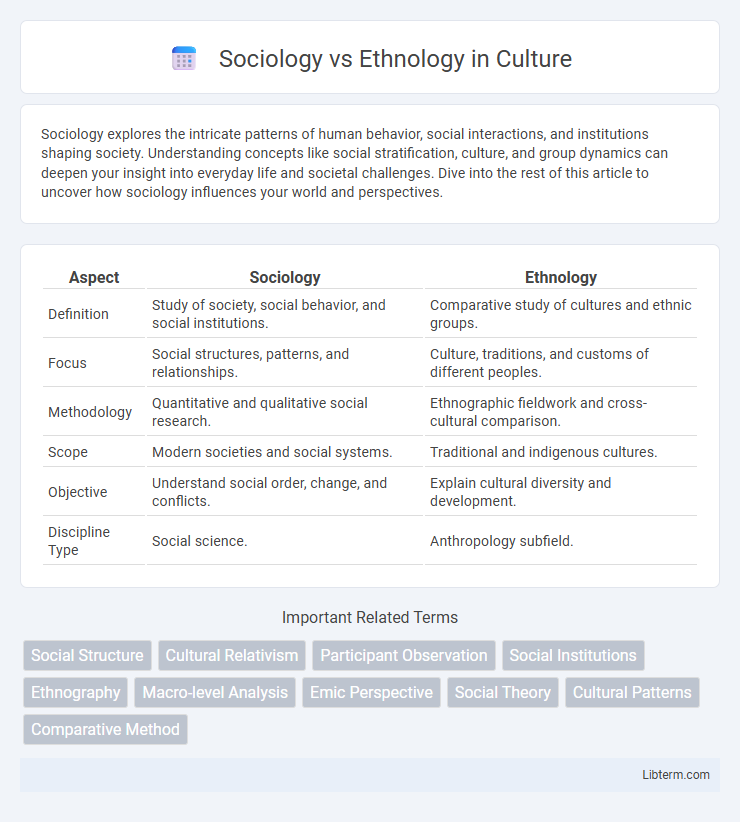Sociology explores the intricate patterns of human behavior, social interactions, and institutions shaping society. Understanding concepts like social stratification, culture, and group dynamics can deepen your insight into everyday life and societal challenges. Dive into the rest of this article to uncover how sociology influences your world and perspectives.
Table of Comparison
| Aspect | Sociology | Ethnology |
|---|---|---|
| Definition | Study of society, social behavior, and social institutions. | Comparative study of cultures and ethnic groups. |
| Focus | Social structures, patterns, and relationships. | Culture, traditions, and customs of different peoples. |
| Methodology | Quantitative and qualitative social research. | Ethnographic fieldwork and cross-cultural comparison. |
| Scope | Modern societies and social systems. | Traditional and indigenous cultures. |
| Objective | Understand social order, change, and conflicts. | Explain cultural diversity and development. |
| Discipline Type | Social science. | Anthropology subfield. |
Introduction to Sociology and Ethnology
Sociology studies social behavior, institutions, and structures, focusing on patterns within societies through empirical research and theoretical analysis. Ethnology, a branch of anthropology, compares and analyzes cultural practices, beliefs, and social organization among different ethnic groups to understand human diversity. Introduction to Sociology emphasizes social dynamics and institutions, while Introduction to Ethnology centers on cross-cultural comparisons and ethnographic methods.
Defining Sociology: Scope and Focus
Sociology systematically studies social behavior, institutions, and structures, emphasizing patterns of human interaction within societies. It explores themes such as social stratification, family dynamics, and cultural norms across diverse populations. The scope of sociology includes analyzing social processes and institutions to understand societal functions and changes.
Understanding Ethnology: Key Concepts
Ethnology explores the comparative study of cultures, emphasizing patterns, social structures, and cultural norms across societies. Key concepts include cultural relativism, participant observation, and kinship systems, which help analyze how groups develop their unique identities and social practices. Unlike sociology's broader focus on social behavior within modern societies, ethnology concentrates on understanding the depth of cultural traditions and their impacts on human experiences globally.
Historical Development of Both Disciplines
Sociology emerged in the early 19th century, pioneered by thinkers like Auguste Comte and Emile Durkheim, focusing on the systematic study of social structures and institutions in industrial societies. Ethnology developed later, rooted in 19th-century anthropology, emphasizing comparative analysis of cultures and customs primarily through fieldwork and ethnographic methods. The historical development of sociology reflects an evolution toward understanding modern societal complexities, while ethnology evolved to document and analyze cultural diversity and human behavior across different societies.
Research Methods in Sociology vs Ethnology
Sociology primarily employs quantitative research methods, such as surveys and statistical analysis, to study social behavior and structures on a large scale. Ethnology relies on qualitative methods, including participant observation and ethnographic fieldwork, to explore cultural patterns and practices in-depth. Both disciplines utilize interviews but differ in scope, with sociology focusing on broader social trends and ethnology emphasizing the detailed study of specific cultural groups.
Areas of Study and Specialization
Sociology primarily investigates social behavior, institutions, and structures such as family, education, and crime through quantitative and qualitative methods. Ethnology specializes in the comparative study of cultures, focusing on customs, traditions, language, and belief systems using ethnographic fieldwork. While sociology emphasizes social patterns and systemic issues, ethnology concentrates on cultural diversity and cross-cultural analysis.
Comparative Analysis: Similarities and Differences
Sociology and ethnology both study human societies, but sociology primarily examines social behavior, structures, and institutions across diverse populations, while ethnology focuses on the comparative analysis of cultures and ethnic groups through detailed fieldwork. Both disciplines utilize qualitative and quantitative methods, yet sociology often employs broader statistical analyses, whereas ethnology emphasizes participant observation and cultural interpretation. The key difference lies in sociology's macro-level focus on social systems versus ethnology's micro-level concentration on cultural meanings and practices.
Practical Applications in Modern Society
Sociology examines social structures, institutions, and group behaviors to address issues like inequality, urban development, and public policy, providing tools for social reform and community organization. Ethnology studies cultural differences and similarities through comparative analysis, offering insights crucial for multicultural integration, cultural preservation, and global conflict resolution. Both disciplines contribute to practical applications by informing education systems, healthcare practices, and social services with a deeper understanding of human behavior and cultural diversity.
Challenges and Critiques within Each Field
Sociology faces challenges such as addressing complex social dynamics and ensuring cultural sensitivity while avoiding overgeneralization of social patterns. Ethnology critiques often highlight difficulties in maintaining objectivity and overcoming ethnocentric bias when comparing diverse cultures. Both fields grapple with methodological limitations and ethical considerations in representing human behavior accurately.
Future Trends in Sociology and Ethnology
Future trends in sociology emphasize the integration of big data analytics and artificial intelligence to analyze complex social behaviors and structures. Ethnology is increasingly adopting virtual ethnography and digital anthropology to study cultural dynamics in online communities and globalized societies. Both fields are converging through interdisciplinary research, leveraging technology to deepen understanding of human social interactions and cultural evolution.
Sociology Infographic

 libterm.com
libterm.com